Famous Kjærulfs
The Kjærulf family has
among its members some who are known by the general public for their outstanding
performance and achievements. No Kjærulf has so far achieved global fame. Below are some of those most well known in their
own country.
Halfdan
Kjerulf (1815 -1868) Composer, Norway
Helge
Kjærulff-Schmidt (1906 - 1982) Entertainer, Denmark
Otto
Richard Kierulff (1825 - 1897) Prime Minister, Norway
Theodor
Kjerulf (1825 - 1888) Geologist, Norway
Skipper
Klement (1484 - 1536) Revolutionary, Denmark
Villy
Kierulff (1900 - 1944) Composer, Denmark
Axel
Kjerulf (1884 - 1964) Composer, Denmark
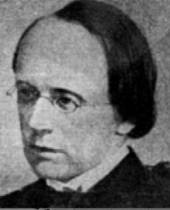 Halfdan
Kjerulf
(17 Sept. 1815 - 11Aug. 1868) Composer, Norway. He wrote the music to the national Norwegian play
"The Wedding in Hardanger" (listen to sample by clicking on Halfdans
picture) and his music is known by all Norwegians.
Another wellknown piece is "Norges Fjælde" (Norway's Mountains). He is
considered to "have an important and indispensable position as part of
Norway's cultural inheritance from 19th century".
Halfdan
Kjerulf
(17 Sept. 1815 - 11Aug. 1868) Composer, Norway. He wrote the music to the national Norwegian play
"The Wedding in Hardanger" (listen to sample by clicking on Halfdans
picture) and his music is known by all Norwegians.
Another wellknown piece is "Norges Fjælde" (Norway's Mountains). He is
considered to "have an important and indispensable position as part of
Norway's cultural inheritance from 19th century".
He was son
of a high government official, was born at Christiania, Norway
on the 15th of September 1815. He graduated from school
in 1834 and His early education was at Christiania
University, for a legal career, and not till he was nearly 26 - on the death of
his father - was he able to devote himself entirely to music. As a fact, he
actually started on his career as a music teacher and composer of songs before
ever having seriously studied music at all, and not for ten years did he attract
any particular notice. Then, however, his Government paid for a year's
instruction for him at Leipzig in 1850
and was gradually recognised as a composer. For many years after his
return to Norway Kjerulf tried in vain to establish serial classical concerts,
while he himself was working with Bjornson and other writers at the composition
of lyrical songs. His fame rests almost entirely on his beautiful and manly
national partsongs and solos; but his pianoforte music is equally charming and
simple. His health was not well for many years and he died unmarried in Norway
at Grefsen, on the 11th of August 1868. A statue created
by Middelthon
has been erected in Oslo on "Halfdan Kjerulfs Plass" (Halfdan Kjerulf
Square).
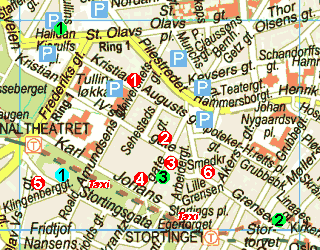
Halfdan
Kjerulfs Plass by green number "1" not far from the Parliament (Stortinget),
Royal Palace and the National Theatre (Nationalteatret)
A wellknown
song in Scandinavia with music by Halfdan Kjerulf: "Denne sang hører
til Bjørnsons bondefortælling "Synnøve Solbakken" fra 1857.
Sang: Og ræven lå
under birkerod
Tekst: Bjørnstjerne Bjørnson, 1857
Melodi: Halfdan Kjerulf, 1858
Og ræven lå
under birkerod
bort ved lyngen, bort ved lyngen,
og haren hoppede på lette fod
over lyngen, over lyngen.
Det er vel noget til solskinsdag!
Det glitrer for, og det glitrer bag
over lyngen, over lyngen.
Tra, la, la, la, la.
The
Norwegian classical piano player Audun Kayser writes:
One
doesn't have to go far outside Scandinavian territory before the name appears to
be unknown to the general public.
Go
to top
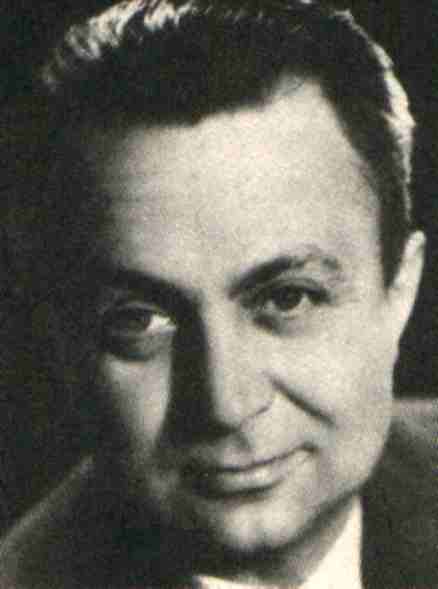 Helge Kjærulff-Schmidt
(22-Feb-1906 - 09-Jul-1982),
Entertainer, Denmark.
Helge Kjærulff-Schmidt
(22-Feb-1906 - 09-Jul-1982),
Entertainer, Denmark.
He became very popular in Denmark because
of his quiet and baroque humor. He also played a number of classical roles and
modern character roles on the Royal Theatre in Copenhagen from 1961.
Go
to top
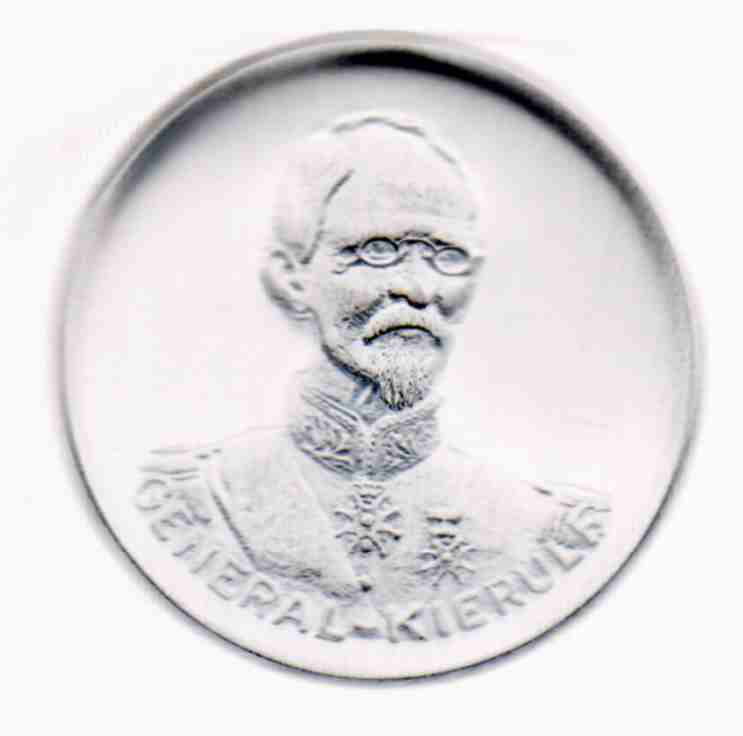 Otto
Richard Kierulf ( 29 January 1825 - 7 January 1897). Prime Minister, Norway.
Otto
Richard Kierulf ( 29 January 1825 - 7 January 1897). Prime Minister, Norway.
Prime Minister 1871 - 1873, Prime
Minister in Stockholm 1873 - 1884
Prime Minister 1 November 1871-21
July 1873.
Norwegian Prime Minister in
Stockholm 21 July 1873-21 March 1884.
Norwegian Prime Minister in Interim Governments in Stockholm 6-21 July 1875 and
16-26 September 1881.
Born in Christiania (Oslo) 29
January 1825, son of Lieutenant Colonel Christian Kierulf and Anne Marie Sophie
Winge.
Married in Christiania 27 May 1857 to Ida Marie Louise Bertelsen (1835-1858),
daughter of merchant Paul Fredrik Bertelsen and Anine Wilhelmine Collstrop.
Married in Christiania 10 May 1861 to Petrea Fernanda Bertelsen (1839-1875),
sister of his deceased wife.
Deceased in Kristiania (Oslo) 7 January 1897. Buried at Vestre gravlund (Western
Cemetery) in Kristiania.

Otto Richard Kierulf was army
officer and politician.
Otto Richard Kierulf was educated as
an infantry officer and became second lieutenant in 1842. In 1847 he transferred
to the artillery, in 1860 reaching the rank of lieutenant colonel and Army
quartermaster.
In addition to his military service,
Kierulf had a broad spectrum of interests and activities. As a young lieutenant
in 1852 he was secretary to the first army commission, and in 1858 he was – as a
captain – secretary to the second army commission. For many years he was on the
editorial staff of the military quarterly Militært Tidsskrift, and as military
writer he became member of the Royal Swedish War Academy and later of the Royal
Norwegian Society of Sciences and Letters. He was member of the boards of the
Main Railway Line and Kongsvinger Line, member of Kristiania City Council for
many years and deputy member of the Storting for Kristiania 1871-1873.
In the autumn of 1871 Kierulf was
appointed Norway’s prime minister after Georg Sibbern, as the first without the
experience of a government member or a central civil servant. Although his
predecessor was disappointed of having “a common artillery officer” succeeding
him, Kierulf soon turned out as one taking his office seriously and able to
voice his own opinion. On the other hand the office as Norwegian prime minister
in Stockholm was now becoming second in importance to the office as first
minister in Kristiania, leading to a situation where Kierulf no longer had the
possibility to influence politics in the way his predecessors had known.
When the office as first minister in
Kristiania in July 1873 was converted to an office as prime minister, Kierulf
continued as Norway’s prime minister in Stockholm. His major task was to work
for the best possible Swedish attitude towards Norway. In this he succeeded,
with the Union Act of 1874 and the Coinage Convention of 1875 as clear results.
By the 17 March 1884 judgment of the
Court of Impeachment Kierulf, as most members of Christian Selmer’s Government,
was relieved of his office for not having implemented the Storting’s decision
that government members should participate in the Storting’s meetings. Later
that year he returned to the Army as colonel and quartermaster general. He was
appointed major general and artillery commander in 1890, and promoted to
lieutenant general shortly before his resignation from the Army in 1896.
Source: government.no
Go to
top
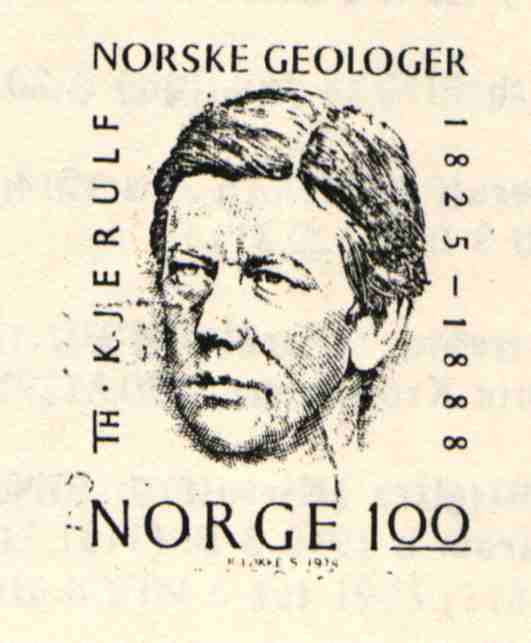 Theodor Kjerulf
(30-Mar-1825 - 25-Oct-1888) Norwegian Geologist.
Theodor Kjerulf
(30-Mar-1825 - 25-Oct-1888) Norwegian Geologist.
He was born
at Christiania, Norway. He was educated in the university
at Christiania, and subsequently studied at Heidelberg, working in Bunsen's
laboratory. In 1858 he became professor of geology in the university of his
native city, and he was afterwards placed in charge of the geological survey of
the country, then established mainly through his influence. His contributions to
the geology of Norway were numerous and important, especially in reference to
the southern portion of the country, and to the structure and relations of the
Archaean and Palaeozoic rocks, and the glacial phenomena. His principal. results
were embodied in his work Udsigt over det sydlige Norges Geologi (1879). He was
author also of some poetical works. He died at Christiania on the 25th of
October 1888.
The "Kjerulf-Glacier"
was named after him on the island of "South
Georgia," 54 degrees South of the Equator, 37 degrees West of
Greenwich, England, in the Antartic. He was commemorated on a postage stamp in
Norway in 1974 as an outstanding Norwegian Geologist.
Go
to top
Skipper Klement
(1484 -
1536) a revolutionary, Denmark. He was the son of Anders Kjærulfs daughter.
During his short life he became a reputable merchant, ship-owner and a captain.
He was a
"famous freebooter," or privateer, who had served for a time as a vice-admiral
under Frederick I, and then had fought for 10 years against enemies of Christian
II, especially the Hanseatics, as a freebooter, scoring well known exploits in
this capacity. He was joined forces with by the pirate Norrby in 1526.
Captain Clement was a loyal champion of Christian II, and in this
capacity became the right-hand man of Count Christopher of Oldenborg, who was
acting as the champion of Christian II in a struggle over the succession to the
Danish throne.
In 1534 the peasants in Northern Jutland decided that they had had enough of
suppression from the ruling class, noblemen and of the Danish king Christian
3rd. Then Skipper Klement took the command of a peasant army and in the battle
of Svendstrup in 1534 he and his army actually gained a victory over the crown.
However, Clement's peasant forces lacked artillery to successfully follow-up
their early successes, and they were defeated in battle at Aalborg, by forces
under the command of Johan Rantzau, when Clement was badly wounded. Although the
wounded Clement escaped from Aalborg, he was thereafter betrayed to the enemy,
who first imprisoned and then executed him by drawing and quartering him, along
with other peasant leaders on 9th of September 1536.
Ever since, Skipper Klement has been a symbol of freedom for oppressed
peasants. An impressive statue of Skipper Klement can be found in Aalborg, Denmark
not far from "Fogedgaard", where Anders Kjærulf settled in mid-1400.
In Danish:
Skipper Klement
(1484 - 1536)
Skipper Clement (Clement Andersen) blev født omkring 1484 i Aaby sogn i
Vendsyssel og døde 1536 i Viborg. Dansk bondesøn af Kjærulf slægt og søofficer
der blev kendt som leder af bondeoprøret i 1534.
Skipper Clement var søofficer under Christian 2. og fungerede i perioden 1525-34
som fribytter der ernærede sig ved kapervirksomhed i Christian 2.s navn, men
hans berømmelse knytter sig først og fremmest til den blodige borgerkrig,
Grevens Fejde, som fandt sted i perioden 1533 til 1536.
I 1523 var Christian 2. sendt i landflygtighed og hans farbror, Frederik 1.,
havde overtaget tronen. Striden mellem Christian 2. og Frederik 1. kulminerede
med at Christian 2. i 1531 blev taget til fange og indespærret på Sønderborg
Slot.
Da Frederik 1. døde i 1533 var hans søn ikke umiddelbart villig til at overtage
kronen på Rigsrådets betingelser, så Danmark stod nu uden konge.
Grev Christoffer af Oldenborg, som lagde navn til den opståede borgerkrig, så nu
en mulighed for, at få den gamle konge, Christian 2., genindsat.
Lübeck besatte, under ledelse af Grev Christoffer af Oldenburg, hele den østlige
del af Danmark. Rigsrådet, der bestemt ikke interesseret i at få den gamle konge
tilbage, måtte nu anmode Frederik 1.s søn, Christian 3., om at overtage den
ledige trone, og Christian 3. blev indsat som konge i Jylland.
Borgerkrigen var nu en realitet og i september 1534 rejstes et omfattende
bondeoprør i Nordjylland under ledelse af Skipper Clement.
Skipper Clements bondeoprør bredte sig efterhånden langt ned i
Midt- og Vestjylland lige til Varde. Clement samlede ca. 6.000 mand i
Vendsyssel, mens en adelshær på 450-500 ryttere og nogle hundrede fodfolk tog
form. De to stødte sammen ved Svenstrup syd for Aalborg 16.oktober 1534.
Bondehæren, der var bevæbnet med alt forhåndenværende, lokkede med taktisk
snilde modstanderen ud i et blødt terræn, og en kombination af taktik fra
Clements side og simpelt overmod fra adelsfolkene sikrede bønderne en
overvældende sejr.
Adelens stilling var på dette tidspunkt meget kritisk, men endnu engang kom
Frederik 1.s gamle feltherre Johan Rantzau til undsætning. Skipper Clement's
bondehær blev splittet og jaget på flugt af Rantzaus hær, som på rekordtid
trængte op gennem Jylland. Skipper Clements resterende styrker blev indesluttet
i Aalborg, som faldt efter få dages belejring den 18. december 1534. Skipper
Clements forsvarere, mellem 7-800 mand, blev hugget ned, hvorefter byen blev
givet fri til plyndring.
Skipper Clement selv undslap blodbadet i Aalborg. Han blev nogle dage senere
forrådt af en bonde og taget til fange. Den 9. september 1536 blev Skipper
Clement henrettet på Viborg Landsting. Han blev halshugget, liget blev parteret
og lagt på fire stejler og på hans afhuggede hoved satte man en bly-krone.
Skipper Clements bondeoprør blev det sidste i Danmark.
Go to
top
Willy
Kierulff (1900 -
1944) Composer, Denmark
Style(s): Popular/light Music
Go
to top
Axel Kjerulf
( 24-Jul-1884
- 19-Sep-1964) Composer, Denmark
Style(s): Popular/light Music
Go to
top
 Halfdan
Kjerulf
(17 Sept. 1815 - 11Aug. 1868) Composer, Norway. He wrote the music to the national Norwegian play
"The Wedding in Hardanger" (listen to sample by clicking on Halfdans
picture) and his music is known by all Norwegians.
Another wellknown piece is "Norges Fjælde" (Norway's Mountains). He is
considered to "have an important and indispensable position as part of
Norway's cultural inheritance from 19th century".
Halfdan
Kjerulf
(17 Sept. 1815 - 11Aug. 1868) Composer, Norway. He wrote the music to the national Norwegian play
"The Wedding in Hardanger" (listen to sample by clicking on Halfdans
picture) and his music is known by all Norwegians.
Another wellknown piece is "Norges Fjælde" (Norway's Mountains). He is
considered to "have an important and indispensable position as part of
Norway's cultural inheritance from 19th century". 

 Otto
Richard Kierulf ( 29 January 1825 - 7 January 1897). Prime Minister, Norway.
Otto
Richard Kierulf ( 29 January 1825 - 7 January 1897). Prime Minister, Norway.
